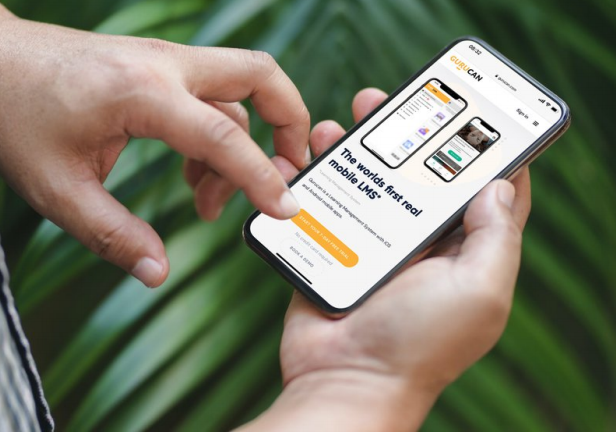 The concept of mobile LMS exists because of the shift in the way the world consumes content.
The concept of mobile LMS exists because of the shift in the way the world consumes content.
Thanks to advances in digital tech, mobile phones rule the world of content consumption. Last year, estimates showed that Americans spent up 3.5 hours on their phones every day.
Hence for content creators and tutors looking to reach a target audience, they must find a way to put that
content on mobile phones. This is what a mobile learning management system (LMS) is all about.
Today, most people read the news on their phones. In the same vein, they do all of their shopping using their
phones. More importantly, with the speed of mobile internet, the process is seamless.
If it’s possible to do all of this via phone, then it’s possible to learn with a phone too. With an LMS mobile
app, tutors have a simple way to teach and reach their target market.
Over the course of this blog, we’ll discuss what a mobile LMS is. We’ll also explore how content creators
can take advantage of the benefits of an LMS app.
What is Mobile LMS?
The definition of a learning management system (LMS) with mobile applications is a framework that helps
content creators deliver training courses via a mobile app. These training sessions can be pre-recorded and
uploaded on the mobile LMS. Or, they may come in the form of live instructor-led training.
Essentially, an LMS with a mobile app facilitates learning, content management, reporting, and payments —
all via a mobile app. Typically, they are set up in a way that students don’t have to be connected to the
internet all the time. With a functional LMS app, students can even take in information offline.
For those curious about what is a mobile LMS, it’s a system that allows instructors to create and deliver
content on a phone. Depending on the capability of the mobile learning management systems, instructors can
monitor progress, learner participation, and even carry out tests!
In addition, a mobile LMS offers instructors an online channel to communicate with learners. This may be
via video conferencing, discussion thread, or online forums.

Why Mobile LMS?
With one simple word, it’s possible to summarize the need for a mobile learning management system. The
word is flexibility. On average, users carry out 221 tasks on their mobile phones. For a personal computer,
that number is 140. Hence, it’s easy to see that people prefer their mobile phones to laptops.
A learning management system with mobile applications allows learners to soak up information whenever
they want. There’s no need to be stuck to a desk or a laptop. Instead, they can simply log in and start
learning at any time.
How To Create a Custom LMS for Mobile?
Now that you understand the why, most content creators will be wondering about the “how.” Factually, the
answer to how to create a custom LMS for mobile lies in programming and coding to create a new app.
However, this can be time-consuming and will cost thousands of dollars.
Instead, the best course of action is to sign up with an LMS SaaS provider. Typically, these apps allow
content creators to upload content and manage it too. It’s a simple, effective alternative. But before choosing
to align with an LMS, some factors will influence this decision.
We will discuss this in the next section.
What are the Features of LMS?
An LMS with mobile app should offer the following features:
Ease of use
Students want to be able to learn on the go. More importantly, they want to be able to do it easily. According
to a study from the Brandon Hall Group, about 44% of companies that learn from a mobile LMS want to
change their providers. The reason is they want apps that are easy to use.
The user experience on a mobile LMS must be top-notch. It should be user-friendly and intuitive enough to
make it easy for the average user. Remember, the audience wants to learn something else. They don’t want
to have to learn to use an app.
Content Management
All LMS solutions offer content management services. However, some do it better than their
contemporaries. Part of learning how to create a custom LMS for mobile is making sure the system can offer
the best content management features.
The content management part of an LMS mobile app should offer the following capabilities:
- Latest international regulations and standards for e-learning
- Ability to upload videos, documents, and exams
- Ability to link to content on a third-party website
- Effective, meaningful organization of the curriculum and learning materials.
Tracking and Reporting
And LMS with mobile app should be able to determine and monitor learner progress. In other words, admins
should be able to track who has learned what and who is slacking. This way, they can simply follow up and
make sure the audience uses the materials they signed up for.
E-Commerce
For content creators and tutors looking to generate revenue by selling courses, their mobile LMS must offer
e-commerce functionality. Standard e-commerce features to look out for include:
- Tracking and record-keeping
- Multiple payment gateways
- Payment notifications
- Branding and customization.
Benefits of Using Mobile LMS
Wondering what the fuss is all about? Like we discussed earlier, the ability to learn on the go is a major
benefit of using a mobile LMS. Other benefits, content creators and their audience can enjoy include:
More Motivation
For most people, taking the step to pick up an online course becomes more comfortable when the restraints
are off. By restraint, we’re talking about the location and accessibility of course materials.
People have more motivation to learn if they can do it from anywhere. Furthermore, with the tiered system
and tracking functionality of a mobile LMS, learners can have goals that spur them on!
Real-time Feedback
Since it’s easier for the audience to use the content on offer, they can provide feedback too. With higher
completion rates for training courses come input from students.
This way, online instructors and content creators can know how to refine their courses. It’s a system that
allows for effective growth.
Distance is not a Problem
Why is there a need to learn how to create a custom LMS for mobile? If not for any other reason, it’s the
wider reach it offers.
With a mobile LMS, subscribers from all over the world can now have access to the content on offer. For
those looking to sell courses via the internet, the reach of a mobile LMS is a great way to do it!

Conclusion
In the world of e-learning, mobile LMS is the present and the future. With content management and ecommerce capabilities, there’s no better way to dispense knowledge.
Gurucan is an EdTech SaaS that offers LMS services to creators and tutors looking to put their content
online. Their one of a kind app for mobile learning is the result of a passion for mobile education.
Gurucan offers an admin panel where creators can easily upload constantly and manage all digital products.
Furthermore, it’s compatible with desktop and mobile. Create a custom mobile LMS with Gurucan now!
References
https://www.skillbuilderlms.com/10-must-have-lms-features/
https://elearningindustry.com/mobile-learning-management-system-6-reasons-why-need
https://www.docebo.com/blog/what-is-mobile-learning/
https://www.easy-lms.com/knowledge-center/lms-knowledge-center/mobile-learning/item10388
Become a Harlem Insider!
By submitting this form, you are consenting to receive marketing emails from: Harlem World Magazine, 2521 1/2 west 42nd street, Los Angeles, CA, 90008, https://www.harlemworldmagazine.com. You can revoke your consent to receive emails at any time by using the SafeUnsubscribe® link, found at the bottom of every email. Emails are serviced by Constant Contact








